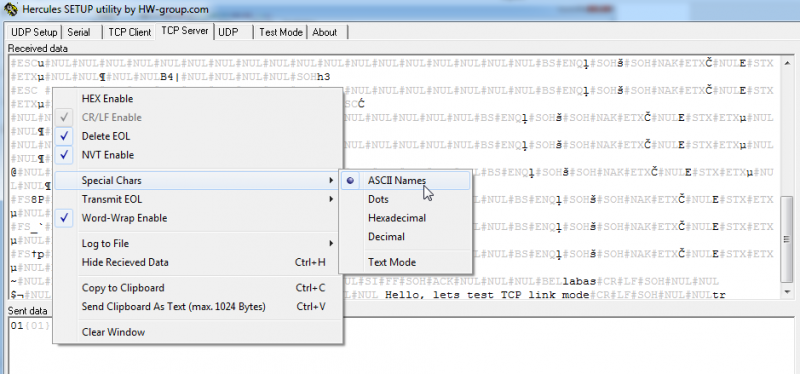FM6 Testing RS-232 and RS-485 TCP Link Mode
Step 1. Understanding what is FMB640 RS232/RS485 TCP Link mode
In this mode link with an external device (for example PC) using text messages can be established. FMB640 has to be connected to the external device through RS232 or RS485. Any string of data coming to RS232 or RS485 will be routed to the server (if the link is currently active). Messages that are exchanged between FMB device and server, have to be packed in Codec.12 format. Here for TCP link establishment, we will be using Hercules. For sending messages from external devices to servers over FMB640 Terminal will be used.
Step 2. Setting parameters in the configurator for TCP Ascii mode test
First of all, in the FMB640 configurator you have to set parameters for RS232 or RS485 (depends on which RS232 or RS485 port you are using) in the global parameters window.
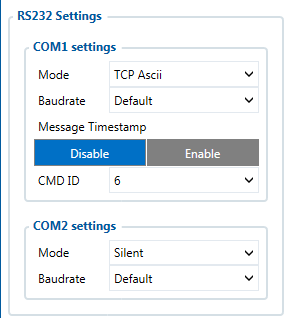
Here in the RS232 settings section, Baudrate can be chosen for any available. The mode has to be chosen for TCP Ascii.
2.1. Message Timestamp
Message Timestamp parameter is used to determine if it is necessary to include a timestamp in the RS232 TCP packet when sending it to the server. If the parameter is Enabled, then Codec 13 is used for data sending. Otherwise, Codec 12 is used.
You can also use RS485 which is also suitable for Ascii TCP Link mode. In order to make a link between FMB640 device and server, Domain and Target Server Port have to be set in the working device profile, GPRS data sending Settings section. When the right parameters are set, you can save the configuration to the FMB640 device.
Step 3. Establishing FMB640 test link with the server through Hercules
In this case, we have a PC that is considered to be a server and an external device at the same time. When FMB640 is configured and connected to the external device, next what we have to do is to start Hercules (Figure 2) which is on the server-side and will be used for sending/receiving messages.
(Please keep in mind that external device RX cable needs to be connected to FMB640 device TX cable and external device TX cable connected to FMB640 RX cable.)
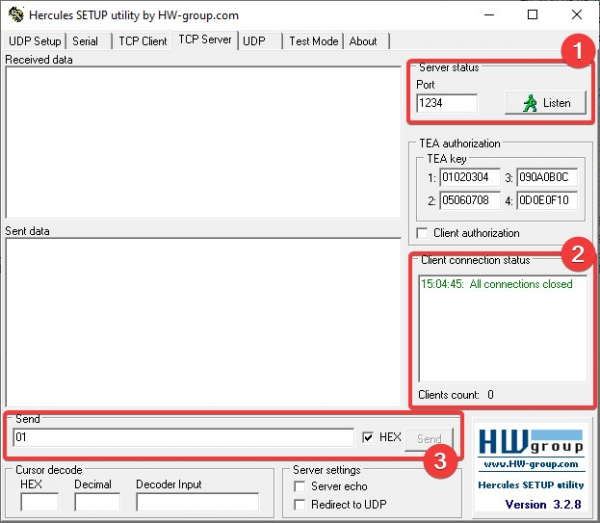
Here you have to choose the TCP Server section from the upper menu. In the marked fields:
1. Write your server (PC) port and press Listen button;
2. In the Client connection status you will be able to see if a connection between server and FMB device has started successfully;
3. In the Send field, you can write a message that is packed in Codec.12 format which will be sent to the FMB640device.
Step 4. Sending from server to external device over Hercules
When sending a message from Hercules, first you have to pack it in Codec.12 format. If you want to send a message to an external device over FMB640from the server, a packed message should be pasted into the Send field in Hercules (Figure 2, marked field 3). The HEX format box should be unchecked if the text is in HEX format (for example: $00$00$00$00$00$00$00$26$0C$01$05$00$00$00$1e$48$65$6c$6c$6f$2c$20$6c$65$74$73$20$74$65$73$74$20$54$43$50$20$6c$69$6 e$6b$20$6d$6f$64$65$01$00$00$1a$ef etc.). When you press the Send button, you will see your message in the Sent data field (Terminal). If the message is sent successfully to FMB640 you can check it in the Terminal window.
Connect Port ½ cable one end to RS232 RX/TX cables on the FMB640device and then connect the USB side to the computer. Please find which port is used for Port ½ cable in the device manager. Please select correct COM Port (1). In this case, we use COM21. Then press connects (2).
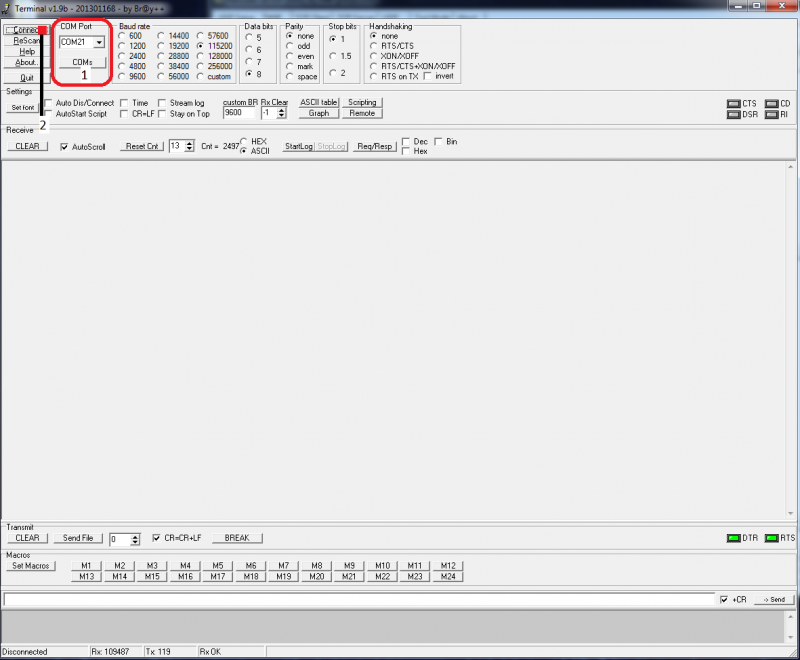
Open Hercules application and just type your message in the marked field (3) and press the Send button (4). If sent successfully, you will see it in Hercules Sent data field (Figure 4). For example test text will be sent: Hello, lets test TCP link mode. In Codec.12 format it looks: $00$00$00$00$00$00$00$26$0C$01$05$00$00$00$1e$48$65$6c$6c$6f$2c$20$6c$65$74$73$20$74$65$73$74$20$54$43$50$20$6c$69$6e$6b$20$6d$6f$64$ 65$01$00$00$1a$ef
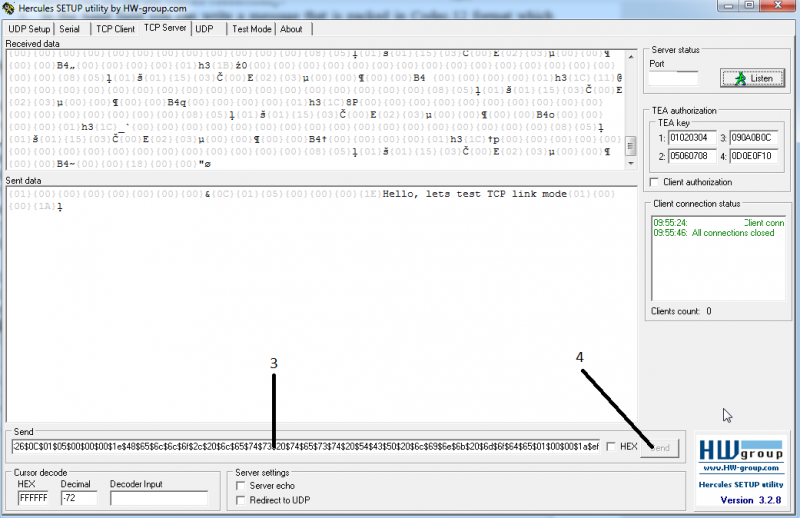
On terminal you should now receive a message:
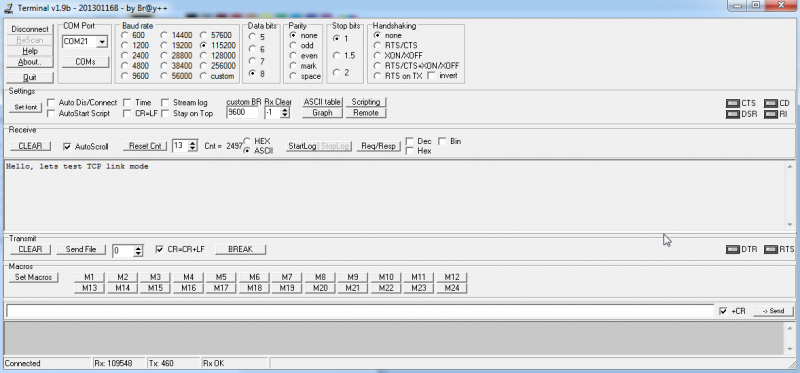
Step 5. Sending from external device to server over Terminal
For testing data sending from external device to server, enter the text you want to send on Terminal and press send.
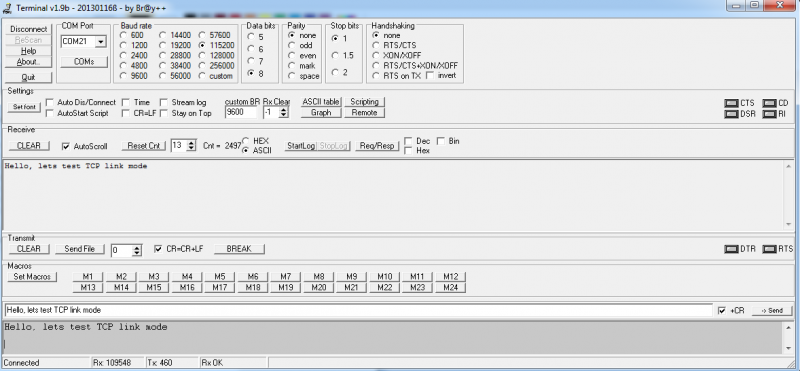
You can check if data is received to a server in Hercules. Sample text: Hello, lets test TCP link mode. Please keep in mind, that special chars (ASCII Names) need to be marked.
